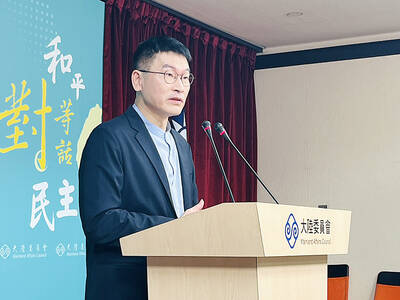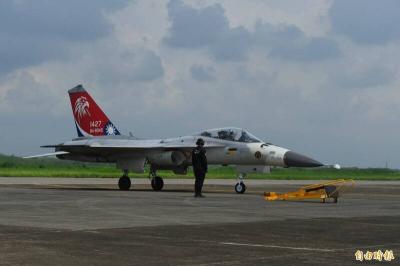Taiwan and China are two independent countries, and that is the cross-strait "status quo" which Taiwan is committed to safeguarding, President Chen Shui-bian (
"Over the past 50 years, the `status quo' across the Taiwan Strait has been that on one side, there is a democratic Taiwan, and on the other, there is an authoritarian China," Chen said.
"Neither of the two countries are subordinate to each other, because they are two independent sovereignties. Both sides have their own national title, national flag, national anthem, legislature, judicial system and military," he said.
Chen told a delegation of the British House of Commons' Foreign Affairs Committee at the Presidential Office yesterday morning that his administration was devoted to upholding peace and stability in the Taiwan Strait, as well as the "status quo."
Taiwan did not wish to see the "status quo" changed unilaterally, he added.
Chen told the delegation that the constitutional re-engineering project in which the nation was currently engaged was a difficult undertaking.
"Judging from the political situation in the legislature and the social environment, I don't think it will be easy to make constitutional changes, especially when they concern an issue as sensitive as sovereignty," he said.
However, a constitution that is no longer viable, timely and relevant must be amended, Chen said.
The key problem with the Constitution, Chen added, lay in the ambiguity of the government system, which was neither a parliamentary system such as the UK's, a presidential system like that of the US, nor the semi-presidential system practiced by France.
"Our Constitution is none of the above. It is time to make a choice among the three," he said.
No matter which government system is adopted, the issue was worth debating, Chen said.
The government had an open attitude regarding the matter, he added.
A more distinctly defined constitutional system was bound to help the administration better govern the country and upgrade the nation's competitiveness, he said.
Chen said that any constitutional reform proposal would have to conform to the amendment process.
In other words, any proposal would have to obtain the approval of three-quarters of the legislature and then the final consent of 50 percent of eligible voters, he said.

LOW RISK: Most nations do not extradite people accused of political crimes, and the UN says extradition can only happen if the act is a crime in both countries, an official said China yesterday issued wanted notices for two Taiwanese influencers, accusing them of committing “separatist acts” by criticizing Beijing, amid broadening concerns over China’s state-directed transnational repression. The Quanzhou Public Security Bureau in a notice posted online said police are offering a reward of up to 25,000 yuan (US$3,523) for information that could contribute to the investigation or apprehension of pro-Taiwanese independence YouTuber Wen Tzu-yu (溫子渝),who is known as Pa Chiung (八炯) online, and rapper Chen Po-yuan (陳柏源). Wen and Chen are suspected of spreading content that supported secession from China, slandered Chinese policies that benefit Taiwanese and discrimination against Chinese spouses of

PROMOTION: Travelers who want a free stopover must book their flights with designated travel agents, such as Lion Travel, Holiday Tours, Cola Tour and Life Tours Air Canada yesterday said it is offering Taiwanese travelers who are headed to North America free stopovers if they transit though airports in Japan and South Korea. The promotion was launched in response to a potential rise in demand for flights to North America in June and July next year, when the US, Canada and Mexico are scheduled to jointly host the FIFA World Cup, Air Canada said. Air Canada offers services to 13 of the 16 host cities of the tournament’s soccer games, including Toronto and Vancouver; Mexico City, Guadalajara and Monterrey in Mexico; Atlanta, Georgia; Boston; Dallas; Houston;

ALIGNED THINKING: Taiwan and Japan have a mutual interest in trade, culture and engineering, and can work together for stability, Cho Jung-tai said Taiwan and Japan are two like-minded countries willing to work together to form a “safety barrier” in the Indo-Pacific region, Premier Cho Jung-tai (卓榮泰) yesterday said at the opening ceremony of the 35th Taiwan-Japan Modern Engineering and Technology Symposium in Taipei. Taiwan and Japan are close geographically and closer emotionally, he added. Citing the overflowing of a barrier lake in the Mataian River (馬太鞍溪) in September, Cho said the submersible water level sensors given by Japan during the disaster helped Taiwan monitor the lake’s water levels more accurately. Japan also provided a lot of vaccines early in the outbreak of the COVID-19 pandemic,

The US approved the possible sale to Taiwan of fighter jet spare and repair parts for US$330 million, the Pentagon said late yesterday, marking the first such potential transaction since US President Donald Trump took office in January. "The proposed sale will improve the recipient's capability to meet current and future threats by maintaining the operational readiness of the recipient's fleet of F-16, C-130," and other aircraft, the Pentagon said in a statement. Trump previously said that Chinese President Xi Jinping (習近平) has told him he would not invade Taiwan while the Republican leader is in office. The announcement of the possible arms